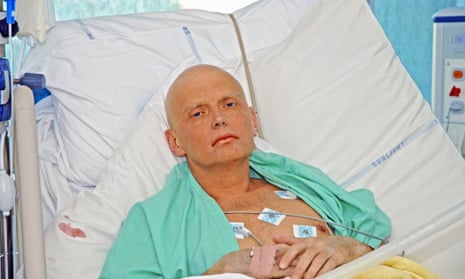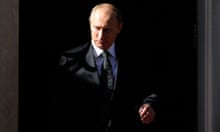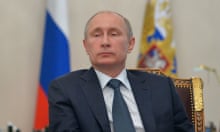Almost 10 years after he drank a cup of poisoned green tea in a Mayfair bar, the report into the murder of Alexander Litvinenko is due to be published, amid strong signs that the British government is reluctant to impose further sanctions on Russia.
The report will be released at 9.35am on Thursday, with Theresa May making a statement to parliament soon after. Litvinenko’s widow, Marina, who received a copy of the report on Wednesday morning, will give her reaction at a press conference with her barrister, Ben Emmerson QC, and solicitor, Elena Tsirlina.
David Cameron received the report, which follows a public inquiry chaired by high court judge Sir Robert Owen, on Tuesday. It is widely believed that Owen will conclude that Litvinenko – who died in November 2006 after sipping radioactive polonium – was the victim of a Russian state assassination.
If, as expected, the Kremlin is blamed directly, Litvinenko’s widow will demand a firm response from Downing Street. She is likely to call for fresh sanctions to be imposed on Russian politicians involved in the murder, as well as against state entities – a tough line that is also backed by the Liberal Democrats.
Last year, Emmerson described Litvinenko as the victim of a “state-sponsored act of nuclear terrorism” on the streets of London, adding that “the trail of polonium led directly to the door of Vladimir Putin’s office”. Emmerson dubbed the Russian president “a common criminal dressed up as a head of state.”
At the time of his murder Litvinenko was a British citizen – and a part-time MI6 spy. Marina Litvinenko is understood to view the report as a major test for Cameron. The government’s response, she believes, will show whether Downing Street is tough on all forms of terrorism, or only tough on terrorism carried out by non-state groups.
This week Foreign Office diplomats said they were against further punishing economic measures against Russia. In 2014, the US and EU imposed sanctions on Kremlin insiders and Russian state corporations in response to Putin’s annexation of Crimea and his covert invasion of Ukraine.
Senior diplomats argue that a degree of restraint is in the wider interests of London-Moscow relations and will make it easier to reach a settlement in Syria’s nearly five-year civil war. David Lidington, a Conservative Foreign Office minister of state, has written to Cameron asking him not to intensify sanctions, Tory sources say.
Owen has written two versions of his report. The closed version circulated only to government insiders includes classified evidence supplied by the UK intelligence services. The second version, given to everyone else, lacks secret documents. This material, however, does inform Owen’s overall findings.
Putin did not comment on last year’s inquiry. The two alleged killers, Dmitry Kovtun and Andrei Lugovoi, both refused to testify. One of Putin’s key allies, Viktor Ivanov, described the hearings in the high court as a “farce” and “knockabout act”.







